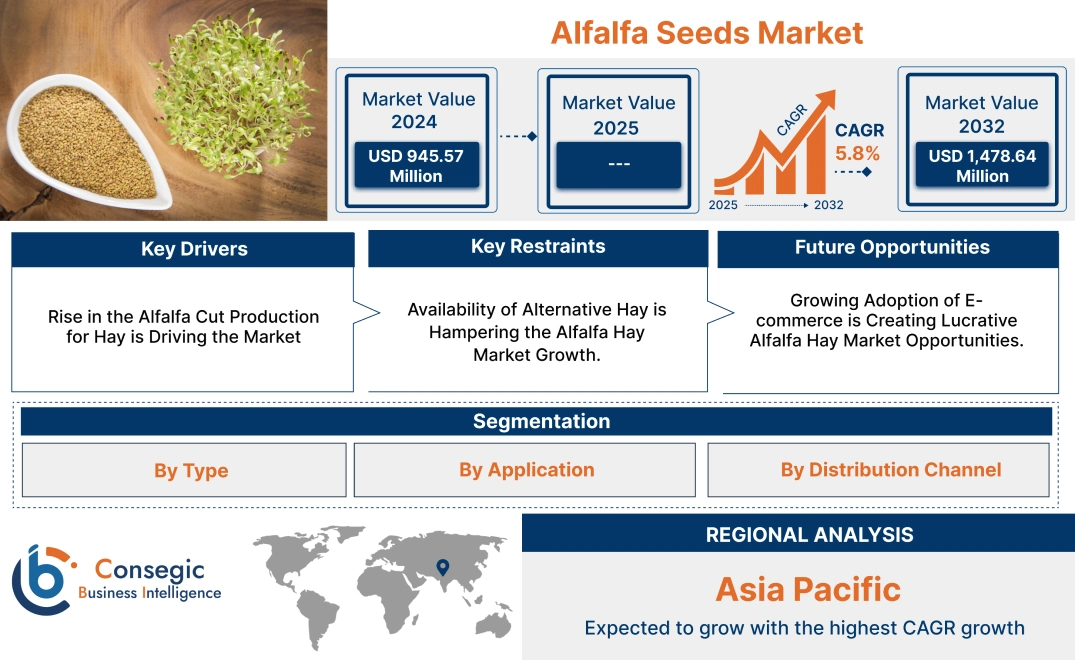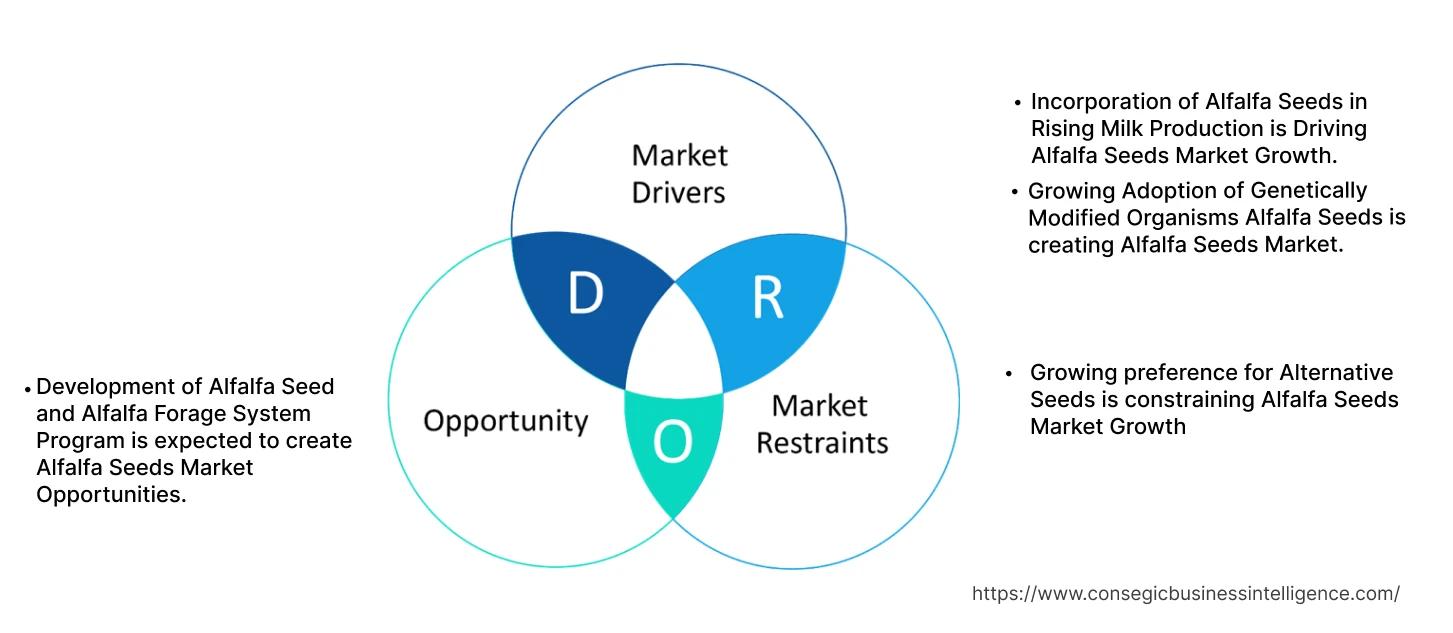- Summary
- Table Of Content
- Methodology
Alfalfa Seeds Market Size:
Alfalfa seeds market size is estimated to reach over USD 1,478.64 Million by 2032 from a value of USD 945.57 Million in 2024, growing at a CAGR of 5.8% from 2025 to 2032.
Alfalfa Seeds Market Scope & Overview:
Alfalfa is also known as Medicago sativa in scientific terminology. It is a perennial legume that provides significant nutritional value and adaptability. It exhibits the characteristic ability to fix atmospheric nitrogen, in turn enriching the soil significantly. Alfalfa is a rich source of protein, vitamins, and minerals, making it a highly nutritious feed for animals. Beyond its role in animal husbandry, alfalfa sprouts are increasingly consumed by humans in salads and sandwiches. Furthermore, its ability to enhance soil health has led to its widespread use as a cover crop in sustainable agricultural practices. Factors such as incorporation of alfalfa seeds in milk production, adoption of genetically modified organisms' seeds are few of the key factors contributing to market growth.
Key Drivers:
Incorporation of Alfalfa Seeds in Rising Milk Production is Driving Alfalfa Seeds Market Growth.
Milk production refers to the process of generating milk from lactating animals for human consumption and industrial use. Alfalfa seeds plays crucial role in the production of milk that enhances milk yield and quality in animals. The increasing global need for dairy products like milk, cheese, yogurt, and others is rising, driving the need for high-quality livestock is feed including these seeds.
- In 2023, according to Ministry of Fisheries, Animal Husbandry & Dairying, milk production in the India registered a development of 22.81% from the year 2018. Alfalfa seeds provides high levels of protein, calcium and high-quality fiber in animals which lead to higher milk production.
Thus, rising milk production is leading to alfalfa seeds market demand through higher quality and yield in milk production.
Growing Adoption of Genetically Modified Organisms Alfalfa Seeds is creating Alfalfa Seeds Market.
Genetically modified organisms (GMO) alfalfa seeds are engineered through biotechnology to enhance desirable traits such as herbicide resistance, pest resistance, and higher nutritional content. They offer superior yield, reduced crop loss, and lower framing cost. Increasing global food need and advancements in biotechnology is driving the adoption of GMO seeds.
- In 2023, according to United States–China Economic and Security Review Commission, China imported GMO alfalfa seeds from the Bayer. These seeds are preferred by farmers due to higher protein content and better digestibility for livestock.
Thus, growing adoption of genetically modified organism alfalfa seeds is leading to alfalfa seeds market expansion through higher yields and lower farming cost.
Key Restraints:
Growing preference for Alternative Seeds is constraining Alfalfa Seeds Market Growth
Use of alternatives seeds such as clover, ryegrass, and silage maize is growing due to low cost and easy availability. These alternatives require less investment in seeds and cultivation while offering adequate nutritional benefits for livestock. Additionally, some of these seeds are easier to grow in varying climate conditions with less favorable environment for alfalfa seeds. The preference for these alternatives reduces the adoption of these seeds, particularly among cost-conscious and small-scale farmers. Moreover, the lack of promotion and incentives for these seeds cultivation further strengthens the adoption of alternatives such as clover, ryegrass, and silage maize. Therefore, growing preference of alternatives seeds is constraining the alfalfa seeds market expansion due to low cost and easy cultivation.
Future Opportunities :
Development of Alfalfa Seed and Alfalfa Forage System Program is expected to create Alfalfa Seeds Market Opportunities.
Alfalfa Seed and Alfalfa Forage System Program (ASAFS) is an integrated research and extension program developed by government and United States. It will support the development of improved alfalfa forage and seed production systems. The program aligns with the sustainable farming practices due to rising requirement for eco-friendly solutions.
- In 2024, National Institute of Food & agriculture launched ASAFS in the United States. It includes an investment of USD 3.7 million to improve development of alfalfa seeds through improved management practices, plant breeding, and automation.
Hence, as per market analysis, development of ASAFS is expected to create alfalfa seeds market opportunities through improved production systems and sustainability.
Alfalfa Seeds Market Segmental Analysis :
By Type:
By type, the market is divided into non-dormant seeds and dormant seeds.
Trends in Type:
- The requirement for non-dormant seeds is generally high due to the convenience they offer farmers.
The non-dormant seeds accounted for the largest market share in the year 2024.
- Non-dormant alfalfa seeds are varieties that do not require a period of dormancy or cold temperatures to germinate, and they typically grow in warmer climates.
- These seeds are ideal for regions with mild winters and longer growing seasons which ensure better investment returns.
- Non-dormant seeds are preferred by farmers because they allow for faster germination and quick cultivation, ensuring a consistent supply of high-quality forage.
- As need for year-round livestock feed grows, these seeds provide farmers with more flexibility and reliability.
- Hence, as per alfalfa seeds market analysis, non-dormant seeds are dominant in the market due to their ability to grow in warmer climates and better flexibility.
The dormant seeds is expected to grow at the fastest CAGR over the forecast period.
- Dormant alfalfa seeds are varieties that requires a period of dormancy or cold temperatures to germinate, and it typically grows in harsh winters.
- These seeds are increasingly being adopted by farmers due to their resilience and adaptability to colder climates.
- Dormant seeds provide an essential forge solution for livestock in regions where winter conditions limit the development of other crops.
- Further, companies are investing in the development of dormant alfalfa with higher quality and salinity tolerance.
- For instance, in 2022, Alforex Seeds Company launched an AFX 670 Hi-Gest Alfalfa. It is a dormant alfalfa seed with excellent performance for high yields and forage quality. This seed has germination and forage salinity tolerance for tough soils.
- Thus, as per alfalfa seeds market analysis, dormant seeds are growing considerably in the market, supported by better germination and higher quality in cold temperatures.
By Application:
By application, the market is divided into livestock feed, salads and sprouts, biofuel generation, and others.
Trends in Application:
- The growing global requirement for animal protein is driving a strong demand for high-quality animal feed, including alfalfa.
- The growing consumer awareness of health and wellness, coupled with the increasing need for plant-based and organic foods.
The livestock feed accounted for the largest market share of 74.55% in the year 2024.
- Livestock feed refers to food provided to domesticated animals such as cattle, sheep, and poultry to support their devlopment, health, and productivity.
- Alfalfa seeds are widely used in the livestock feed due to higher protein, fiber, and mineral content.
- Further, expanding livestock feed sector in countries is driving the development in the market.
- For instance, in 2022, according to Department of Animal Husbandry and Dairying, livestock feed sector in India is increased by compound annual growth rate of 7.67% from the year 2015. These seeds are widely used in the livestock feed to provide high levels of protein, calcium and high-quality fiber in animals.
- Thus, as per market analysis, these seeds are wildly used in livestock feed to provide high fiber and mineral content in animals.
The salads and sprouts is expected to grow at the fastest CAGR over the forecast period.
- Salads and sprouts are fresh, raw foods typically consumer for their health benefits and offers vitamins, minerals, and antioxidants.
- The use of alfalfa seeds is growing in salads and sprouts due to their crisp texture and nutritional value.
- With growing consumer interest in plant-based diets and healthy eating, these seeds are increasingly adopted to provide low calorie and high nutrients.
- Further, due to their health benefits and easy availability, seeds are being used by commercial food manufacturers for various salads and sprouts dishes.
- Hence, as per market analysis, use of these seeds is growing in salads and sprouts due to their health benefits and nutritional value.
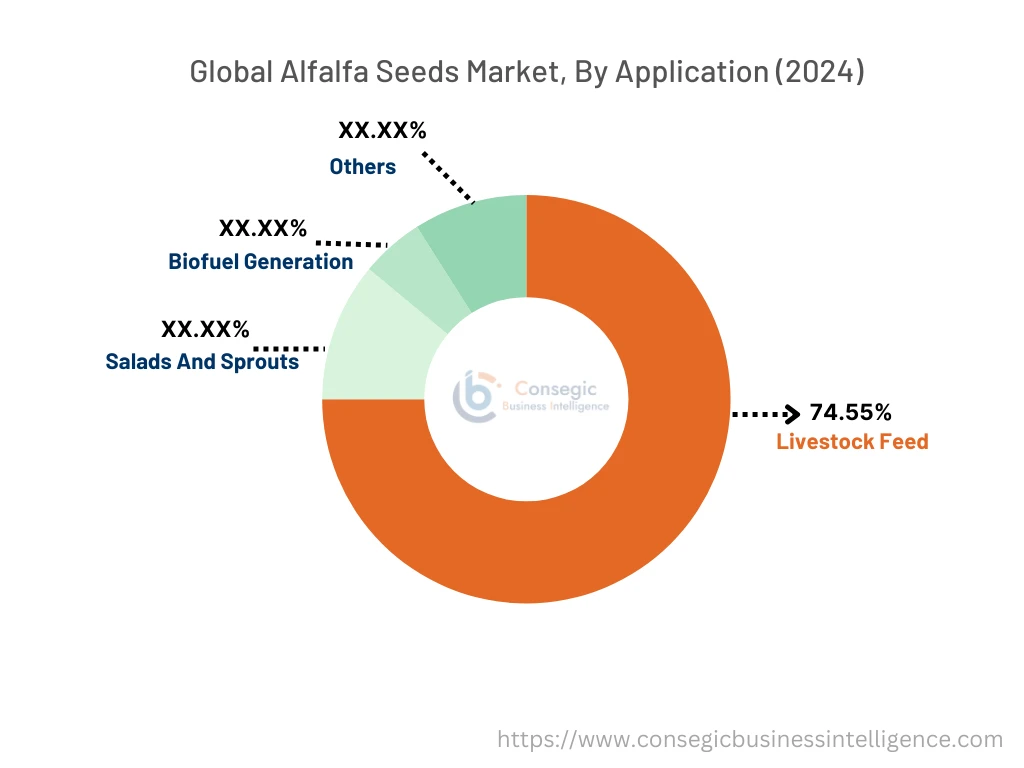
By Distribution Channel:
By distribution channel, the market is divided into direct sales, retail sales, and online sales.
Trends in Distribution Channel:
- The convenience and accessibility of retail channels is a trend to drive segment trajectory.
Direct sales accounted for the largest market share in the year 2024.
- Direct sales is a type of distribution channel where products are sell directly to the customers without any intermediaries.
- Alfalfa seeds are widely distributed through direct sales due to strong relationships with large-scale farmers and buyers.
- Direct sales also helps these seed companies to control the entire sales process, from pricing to delivery, ensuring higher margins and personalized offerings.
- Direct sales provide bulk amount of seeds to commercial livestock producers and large agricultural operations, ensuring better product quality and consistent supply.
- Thus, these seeds are widely distributed through direct sales by ensuring bulk supply and better product quality to the customers.
Online sales is expected to grow at the fastest CAGR over the forecast period.
- Online sales is a type of distribution channel refers to the selling of goods and services online through digital platforms and marketplaces.
- Adoption of online sales is growing in the distribution of alfalfa seeds due to wider reach and customer convenience.
- Farmers and livestock manufacturers are easily accessing seeds of different varieties and prices, along with detailed product descriptions and user reviews.
- Further, growing online sales is contributing to the adoption of these seeds among the customers.
- For instance, in 2022, according to Ecommerce Europe, online sales turnover in Europe is increased by 5.8% as compared to the year 2021. These seeds are distributed through online sales to farmers, livestock manufacturers, and other customers.
- Thus, as per market analysis, adoption of online sales is creating in the market opportunities to wider customer reach and detailed product descriptions as per trends.
Regional Analysis:
The regional segment includes North America, Europe, Asia Pacific, the Middle East and Africa, and Latin America.
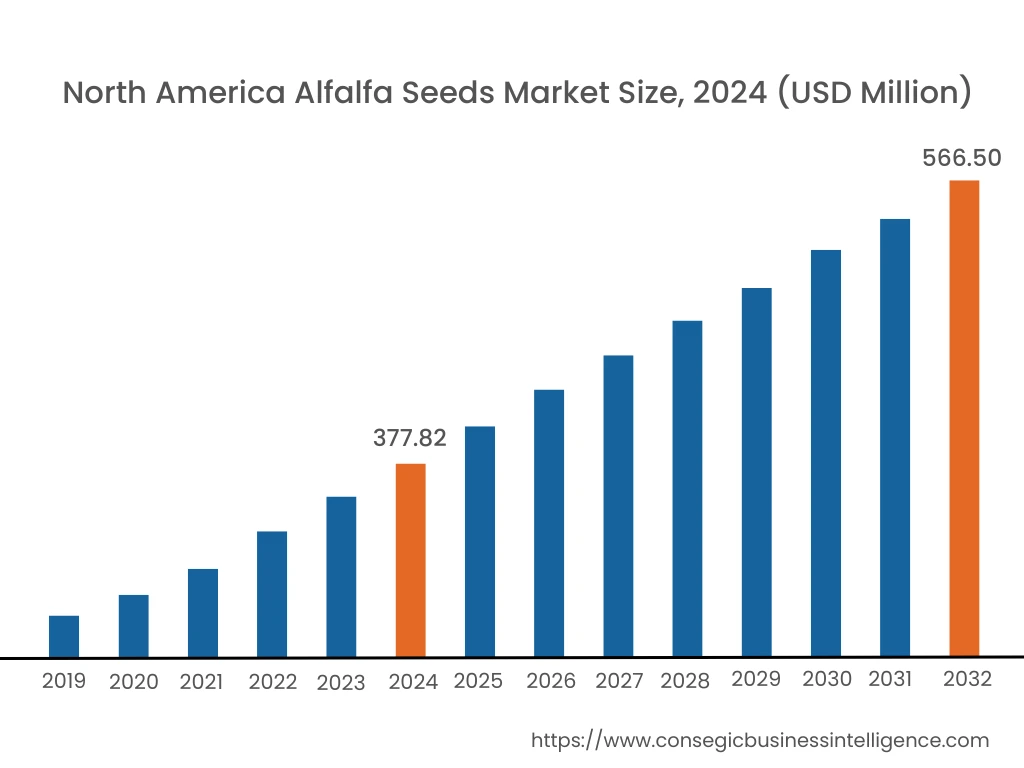
In 2024, North America accounted for the highest alfalfa seeds market share at 35.98% and was valued at USD 377.82 Million and is expected to reach USD 566.50 Million in 2032. In North America, the U.S. accounted for the highest alfalfa seed market share of 70.56% during the base year of 2024.
The strong need for dairy and beef products in North America are driving the market trend for seeds. Dairy cows, with their high milk production, require a protein-rich diet. Alfalfa acts as a prime source of this diet. Similarly, beef cattle benefit from alfalfa's protein content. This fosters overall animal well-being.
- For Instance, according to NCBI, a significant component of beef production is meat. It accounted for 10% of U.S. commercial beef production in 2021.
Moreover, the growing global population and rising consumer incomes are driving an increased need for dairy and beef products. This in turn is increasing the need for livestock feed, including alfalfa. This substantial need for dairy and beef products within North America establishes a robust market for these seeds.
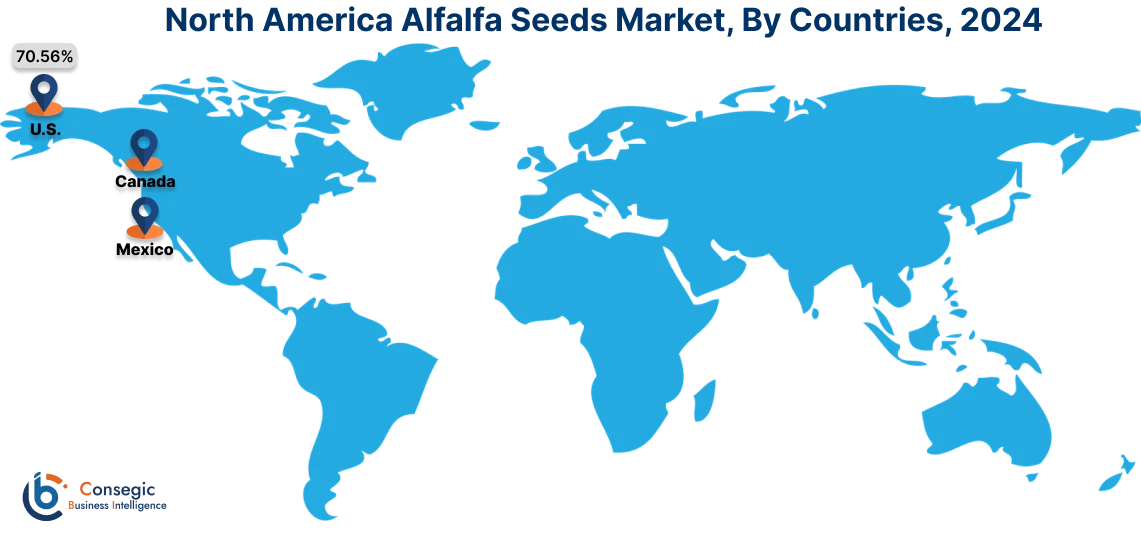
The Asia Pacific alfalfa seeds market is experiencing growth rate of 6.74% over the forecast period. The primary factor is driving the market is the growing livestock populations in countries like India and China. As these nations experience rapid economic development and rising consumer incomes, the need for animal protein is escalating significantly. Animal proteins include meat, dairy, and eggs. To meet this requirement, livestock production requires an increase in the supply of high-quality animal feed. Alfalfa, with its rich protein content, high digestibility, and ability to enhance milk production, has become a key component of livestock diets in the region. Additionally, the need for alfalfa seeds is experiencing a substantial rise, driving the development of the Asia Pacific seeds market.
The European alfalfa seeds market is experiencing a rise due to the increasing need for dairy products. As consumer preferences shift towards healthier and more sustainable food choices, dairy products have become a staple in European diets. To meet this growing requirement, dairy farmers are increasing their production. This requires the utilization of high-quality feed to optimize milk yield and animal health. Alfalfa, with its exceptional nutritional value, digestibility, and ability to enhance milk production, has become a key component of dairy cattle diets across Europe. Additionally, the demand for these seeds, the vital input for cultivating this valuable forage crop, is on the rise, driving the growth of the European alfalfa seeds market.
The alfalfa seeds market in the Middle East and Africa is experiencing development driven by a shift towards sustainable agriculture. Concerns over climate change, water scarcity, and soil degradation are pushing farmers to adopt more sustainable farming practices. Alfalfa, with its deep root system that improves soil health and its ability to thrive in arid and semi-arid conditions, is recognized as a key component of sustainable agricultural systems. As a result, the demand for high-quality, drought-resistant, and disease-resistant seeds is on the rise, driving the development of the alfalfa seeds market trend in the Middle East and Africa.
The Latin American alfalfa seeds market demand is experiencing growth driven by the increasing popularity of organic farming practices. Consumers are increasingly demanding organic and sustainably produced food products, including dairy and meat. This shift in consumer preferences is driving a increase in demand for organic livestock feed, including alfalfa. As a result, farmers are transitioning to organic farming methods. This requires the use of organic seeds. Furthermore, the region's favorable climate and abundant land resources make it well-suited for organic alfalfa cultivation. The growing emphasis on sustainable agriculture and the increasing availability of organic certification programs are further propelling the growth of the organic alfalfa seeds market trend in Latin America.
Top Key Players and Market Share Insights:
The alfalfa seeds industry is highly competitive with major players providing products to the national and international markets. Key players are adopting several strategies in research and development (R&D) and product innovation to hold a strong position in the global alfalfa seeds market. Key players in the alfalfa seeds industry include-
- Bayer Group (Germany)
- DLF (Denmark)
- Forage Genetics International, LLC (United States)
- Monsanto Company (United States)
- La Crosse Seed (United States)
- Syngenta (Switzerland)
- Alforex Seeds LLC (United States)
- Royal Barenbrug Group (Netherlands)
- DuPont Pioneer (United States)
- Dyna-Gro Seed (United States)
Alfalfa Seeds Market Report Insights :
| Report Attributes | Report Details |
| Study Timeline | 2019-2032 |
| Market Size in 2032 | USD 1,478.64 Million |
| CAGR (2025-2032) | 5.8% |
| By Type |
|
| By Application |
|
| By Distribution Channel |
|
| By Region |
|
| Key Players |
|
| North America | U.S. Canada Mexico |
| Europe | U.K. Germany France Spain Italy Russia Benelux Rest of Europe |
| APAC | China South Korea Japan India Australia ASEAN Rest of Asia-Pacific |
| Middle East and Africa | GCC Turkey South Africa Rest of MEA |
| LATAM | Brazil Argentina Chile Rest of LATAM |
| Report Coverage |
|
Key Questions Answered in the Report
How big is the Alfalfa Seeds market? +
In 2024, the Alfalfa Seeds market is USD 945.57 Million.
Which is the fastest-growing region in the Alfalfa Seeds market? +
Asia Pacific is the fastest-growing region in the Alfalfa Seeds market.
What specific segmentation details are covered in the Alfalfa Seeds market? +
By Type, Application and Distribution Channel segmentation details are covered in the Alfalfa Seeds market.
Who are the major players in the Alfalfa Seeds market? +
Bayer Group (Germany), DLF (Denmark), Syngenta (Switzerland), Alforex Seeds LLC (United States) are some of the major players in the market.
